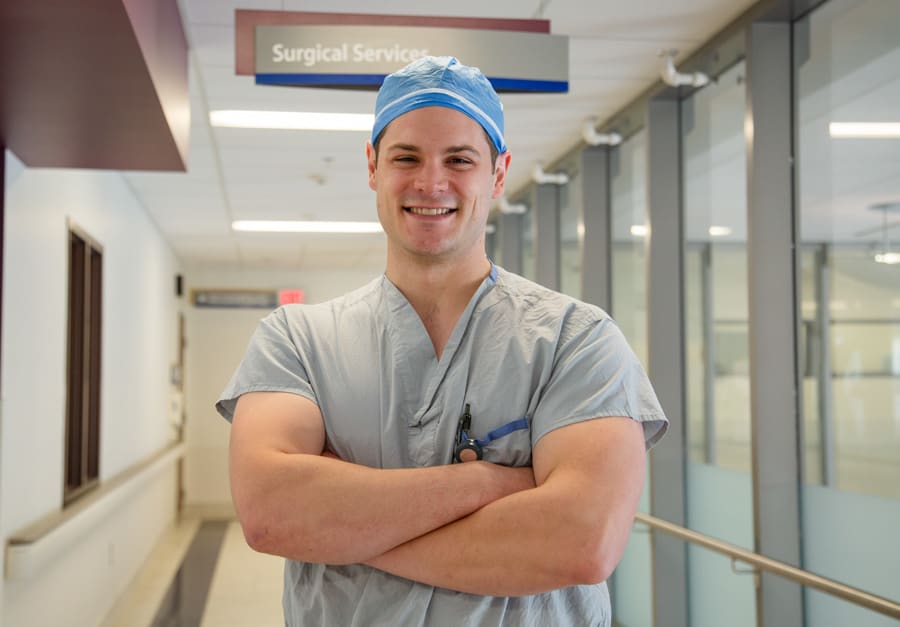The Making of an MD is a multi-story series following a medical school student through training to become a physician. This is Part 4 in the series.

Medical learner Grant Sweeny has discovered a passion for both surgical and clinical work, and hopes to combine those in a residency in urology.
Third time’s a charm. Six of one, half a dozen of the other. Dressed to the nines.
If Grant Sweeny wasn’t busy writing applications for a residency in urology after he graduates from medical school next year, he might be tempted to add to the canon of numerical homages with an ode to the No. 18.
Long before this final leg of his journey as a medical learner with McMaster University’s Michael G. DeGroote School of Medicine – Niagara Regional Campus, Sweeny ranked his preferred specialty 18th out of 20 for pre-clerkship electives.
Now, after nearly a year spent rotating through a variety of medical and surgical specialties to try them on for a career, urology is his first – and only – choice for his post-graduate training.
“It was a completely serendipitous situation,” Sweeny says. “So I always say to med students who are coming in, ‘Stay broad and take the opportunity to explore different things because if I hadn’t been in my 18th pick, then I may have never settled on this being the path for me.’"
A little over a year ago, family medicine, internal medicine and oncology topped his list of prospective careers. He was sure the clinical rather than the surgical side of medicine was where he fit in.
But then along came lucky No. 18 in summer 2024 during those pre-clerkship electives. During a two-week immersion in urology, which combines clinical and surgical practice, Sweeny’s perspective – and career path – shifted entirely.
Since then, he’s completed four other rotations in urology, with placements at Western University, McMaster, and the University of Toronto. He’s even completing a urology research paper that he aims to publish next year.
For someone who felt unsure about surgery when he started medical school, Sweeny has grown to love the balance of clinical duties and time in the operating room that the specialty offers.
“From my surgical rotations, I’ve built the confidence that people aren’t necessarily born to be surgeons. Surgeons are really people who are built through experience and learning,” he says. “As I’ve spent more time in operating rooms, surgical clinics and surgical rounds, I’ve developed that ability.”
“We’re putting in the work now so that we can be the best physicians and surgeons that we can be, so that we can take care of people and we can do right by our patients, and ultimately feel confident in what we’re doing."
The long-term relationships that urologists can develop with their patients are also a draw, he adds. Having opportunities to enhance someone’s life confirmed his decision.
“The issues that you have in urology are really interesting to me and it’s quality-of-life work. If you have somebody who can’t pee and you can help them with that, then you’ve substantially changed their life in a really meaningful way.”
These days, Sweeny is donning scrubs for a rotation in general surgery. It’s one of his last, with orthopedic surgery next on his list of core rotations to complete.
Even though general surgery isn’t his chosen specialty, he’s taking in all he can on days that can run 16 hours when he’s on call, and be filled with patient follow-up, gathering new patient history, discussing possible plans of care that are reviewed by the attending surgeon, and time in the OR.
They’re longer shifts than what he experienced in family medicine, pediatrics and psychiatry, but he starts each one with an eye to a future beyond going home to sleep at the end of the day.
“We’re putting in the work now so that we can be the best physicians and surgeons that we can be, so that we can take care of people and we can do right by our patients, and ultimately feel confident in what we’re doing,” Sweeny says. “I’m excited to have the opportunity to put that work in. I find it motivating.”
Equally compelling to him are those residency applications. He is applying wherever placements are offered in Canada. Last year, the match rate for med school graduates who interviewed for a urology residency was 90 per cent, he says.
“Not everyone got one but it’s not terrible,” Sweeny notes hopefully.
Wherever he winds up will be just the beginning, however. A urology residency, which isn’t offered in Niagara, runs five years. One to two years of fellowship can follow.
His skills will be in demand anywhere he goes when he’s done. According to the Canadian Urological Association, more than 72 per cent of urologists are over the age of 45, and one-third of those are older than 55, suggesting a significant number of retirements on the horizon. Meanwhile, demand for care by urologists is rising because of an aging population.
Until he has a patient roster of his own, Sweeny is absorbing everything he can and reflecting on what he’s learned – mostly about himself – so far in the process.
“You can do whatever you set your mind to,” he says. “If you’d have told me at the beginning of medical school that I was going to be applying to surgical residencies, I would have said, ‘What are you talking about?’ But that’s the way things have worked out.
“Keeping that internal locus of control – you’re in charge of your destiny and what you do – has been very important for me.”

